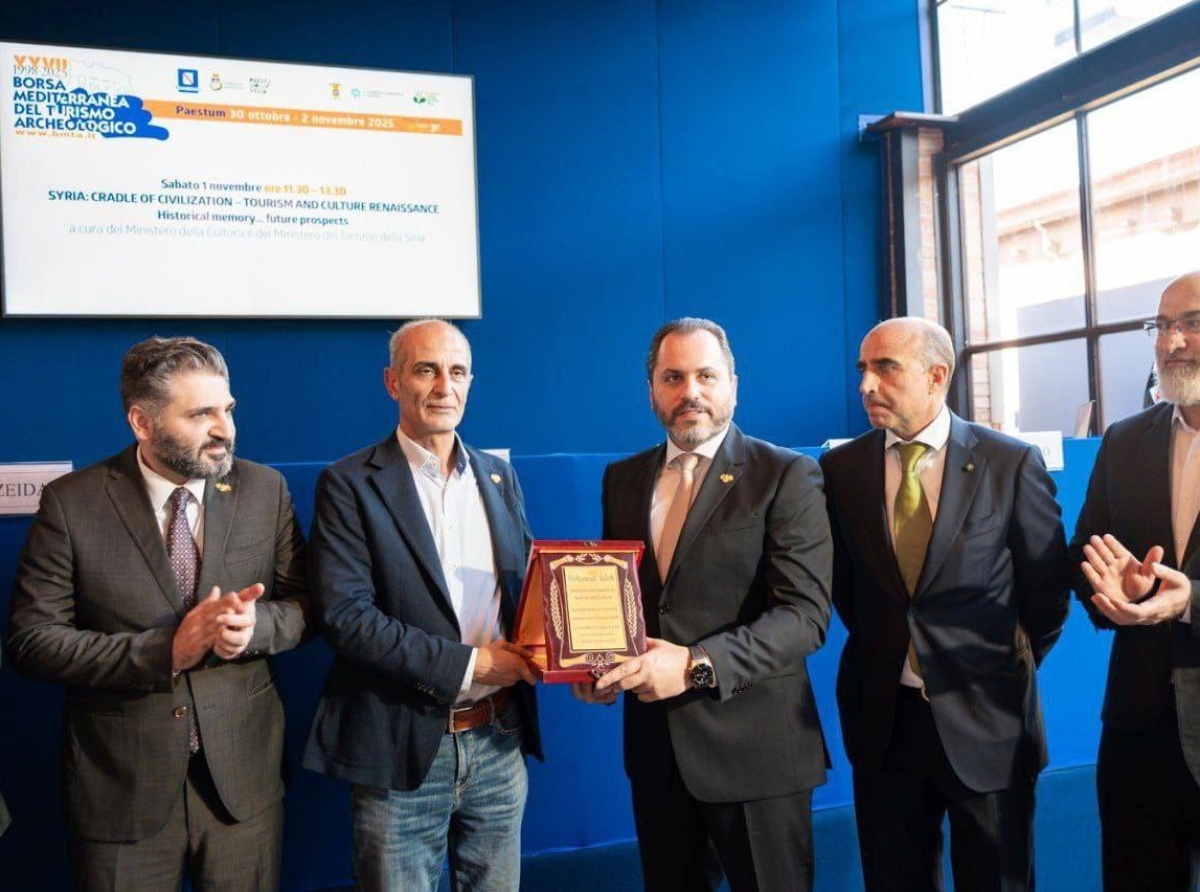“Tourism as a Bridge for Peace”: The Syrian Minister of Tourism on Reopening, Heritage Protection, and International Cooperation
In this exclusive interview, the Minister of Tourism of the Syrian Arab Republic outlines the country’s phased roadmap to reopen its ancient sites, a new Responsible Tourism Charter to balance economy and preservation, and the digital and diplomatic strategies that aim to turn Syria’s post-conflict recovery into a model of sustainable cultural development.
In the framework of the XXVII Borsa Mediterranea del Turismo Archeologico (BMTA) — held in Paestum in 2025 under the sign of dialogue between archaeology, diplomacy, and innovation — Archeomatica had the honour of interviewing H.E. Mazen Al Salhani, Minister of Tourism of the Syrian Arab Republic.
His presence at the event marked a symbolic and strategic return of Syria to the international arena of cultural cooperation, embodying a vision of heritage as both an act of reconstruction and a gesture of reconciliation. In this exclusive interview, Minister Al Salhani delineates the country’s roadmap for the gradual reopening of archaeological and historical sites, the implementation of a Responsible Tourism Charter, and the deployment of digital infrastructures and immersive technologies to ensure transparency, inclusivity, and sustainability.
Set against the renewed Mediterranean dialogue that seeks to transform past fractures into bridges of culture and hope, Syria’s post-conflict tourism strategy — grounded in sovereignty, community engagement, and innovation — offers a profound reflection on how cultural heritage can become both a driver of recovery and a foundation for peace.
What is your roadmap for the gradual reopening of major cultural and historical sites, and which safety and territorial criteria will guide this process?
The Ministry of Tourism, in coordination with the Ministry of Culture and the Directorate General of Antiquities and Museums, is implementing a phased plan to reopen major cultural and historical sites. This process prioritizes regions that are fully secured, have restored infrastructure, and can ensure the safety of visitors and heritage assets. Our roadmap includes three stages: 1. Assessment and stabilization, focusing on structural integrity and risk prevention. 2. Restoration and capacity building, training local custodians and service providers. 3. Gradual reopening, starting with pilot sites under international standards for visitor management. We are working closely with local communities to guarantee that tourism growth aligns with territorial stability and cultural continuity.
How will you reconcile economic recovery and heritage protection, preventing tourism from becoming a source of pressure or speculation in fragile archaeological areas?
Balancing economic recovery and heritage preservation is a central principle of our tourism policy. We are introducing a “Responsible Tourism Charter” that sets limits on visitor numbers, encourages community-based tourism, and promotes reinvestment of tourism revenues into site maintenance and conservation. Additionally, environmental and heritage impact assessments are now mandatory for all new tourism projects. By empowering local stakeholders and encouraging small and medium enterprises, we aim to distribute economic benefits while avoiding speculation and overexploitation.
Is there a national plan for training and certifying tour guides and local operators, based on ethics, security, and inclusive storytelling that reflects the diversity of Syria’s history?
Yes, we have launched the National Program for Tourism Capacity Building, in collaboration with universities and cultural institutions. The program includes certification courses for tour guides, emphasizing ethical conduct, historical accuracy, and inclusivity. Syria’s multicultural heritage — encompassing ancient civilizations, faiths, and traditions — is at the heart of our training curriculum. We are also developing a digital registry for licensed guides to enhance transparency and quality assurance.
What digital strategy will support post-conflict cultural tourism — online booking, transparent ticketing systems, mobile apps, or augmented-reality experiences for inaccessible sites?
Digital innovation plays a crucial role in our recovery strategy. We are working on an integrated e-tourism platform that will centralize online booking, digital ticketing, and tourist information. In partnership with Syrian and international technology experts, we are developing virtual and augmented-reality experiences for sites under restoration or located in sensitive areas, allowing remote access to Syria’s heritage. Our aim is to make culture accessible while ensuring transparency, data security, and sustainability.
What types of international partnerships do you foresee (UNWTO, World Bank, Gulf investment funds, or European NGOs) to finance sustainable tourism infrastructures without compromising national sovereignty or cultural integrity?
Syria is open to constructive and respectful partnerships that align with our vision of sovereign and sustainable development. We are engaging with international organizations such as UNWTO, UNESCO, and ICCROM, as well as with friendly nations and regional development funds. Our priority is to attract investments that respect local identity and environmental standards. We welcome partnerships that promote capacity building, infrastructure modernization, and heritage protection, always under national leadership and oversight.
Considering the historical ties between Syria and Italy, what kind of bilateral cooperation would you most welcome — joint promotion of Mediterranean itineraries, training in sustainable heritage tourism, or twinning between Syrian and Italian UNESCO sites?
Syria and Italy share deep historical and cultural connections across the Mediterranean. We highly value Italian expertise in heritage conservation and sustainable tourism. We would welcome collaboration in three main areas: Joint promotion of cultural itineraries, highlighting shared Mediterranean history. Professional training programs, particularly in restoration, digital documentation, and eco-tourism management. Twinning initiatives between Syrian and Italian UNESCO sites, fostering mutual learning, youth exchanges, and collaborative exhibitions. Such cooperation would not only strengthen cultural diplomacy but also reinforce the role of heritage as a bridge for peace and understanding.


